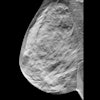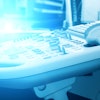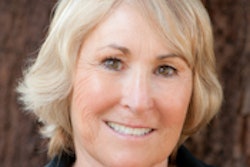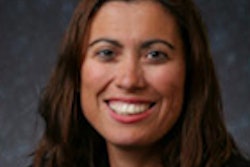Despite an ongoing, heated debate over when women should start breast cancer screening, more than 97% of radiologists continue to advocate having yearly mammograms beginning at age 40. What's more, they follow that counsel themselves, according to a study published in the June edition of the American Journal of Roentgenology.
In 2009, the U.S. Preventive Services Task Force (USPSTF) recommended biennial screening in women ages 50 to 74 and declared that the net benefit from screening in women ages 40 to 49 was small. USPSTF's action resulted in confusion among the medical and patient populations and a measurable decrease in support for screening women younger than 50, according to lead author Dr. Jiyon Lee, of NYU School of Medicine, and colleagues.
 Dr. Jiyon Lee from NYU School of Medicine.
Dr. Jiyon Lee from NYU School of Medicine.Unfortunately, there's no end in sight to the confusion: In April, the task force released a draft of updated guidelines that restate the 2009 recommendations.
But medical societies and radiologists themselves have disregarded USPSTF's guidance, sticking instead to the group's 2002 recommendation, which advised yearly mammography for women 40 years and older, Lee and colleagues wrote (AJR, June 2015, Vol. 204:6, pp. 1336-1344).
"Through the debate that ensued [following the 2009 recommendation], both in the media and in the medical literature, these guidelines were, on balance, discredited and disavowed," the authors wrote. "Several medical organizations, including the American Cancer Society (ACS), the American College of Radiology, the Society of Breast Imaging, and the American College of Surgeons, reaffirmed their support for the 2002 guidelines."
Yet the charged discussion about screening mammography persists, as does the threat of a continued decline in breast cancer screening and, thus, the potential for an increase in later-stage diagnoses and mortality, according to the authors. Radiologists can play a key role in helping patients negotiate conflicting data, especially if they practice what they preach.
"If you are seeking a professional opinion, wouldn't you go to the experts?" Lee told AuntMinnie.com. "As breast imagers, we see it all, from screening mammograms to callbacks and biopsies. We understand about false positives, but as this data shows, still advocate for annual screening starting at age 40."
Lee and colleagues wrote the study with a broad audience in mind, she said.
"We aimed to write this paper in a way that would be accessible not only to nonradiologist physicians, but also to other healthcare providers and women themselves," Lee said.
Physician, heal thyself
Between October and December 2013, Lee's group invited U.S. breast radiologists via the Society of Breast Imaging's (SBI) website to participate in a survey that included personal and practice background information; what screening mammography protocol they would recommend for their average-risk patients, friends, and family; and their personal screening habits based on whether they are female or male.
The study included 487 surveys, and the team divided the participants into three groups:
- Women 40 years or older
- Women younger than 40
- Men
Of the survey participants, 98% recommended yearly mammography for patients 40 years and older, and 99% recommended yearly mammography for family and friends 40 years and older.
Participating radiologists also followed their own screening mammography recommendations: Overall, 97% have or would have yearly mammography starting at age 40. In group 1, 96% (191/198) receive yearly mammograms; in group 2, 100% (83/83) have or will have yearly mammography starting at age 40; and in group 3, 97% (171/176) would have yearly mammography beginning at age 40 if they were women.
"For average-risk women, the 2009 USPSTF recommended biennial mammography limited to women ages 50 to 74 years," Lee and colleagues wrote. "None of the radiologists polled made this recommendation to their patients. The overwhelming majority recommended annual mammography for average-risk women ages 40 years and older, whether they were patients or family members and friends."
Because they actually see the women who are recalled from screening to undergo diagnostic exams, breast imagers are attuned to the potential anxiety associated with screening recalls and can help patients put the "harm" of recalls and biopsies in perspective, according to Lee.
"No matter how perfect we make our imaging technology, no matter how much we seek to improve our diagnostic acumen, these factors will have limited benefit if women aren't getting screened," she said. "Any woman's choice about when and how often to undergo screening mammography should be respected, but it should be influenced by informed decision-making, not confusion or a lack of access."




















